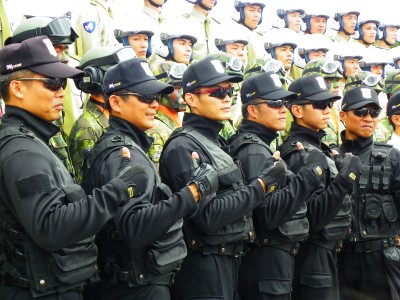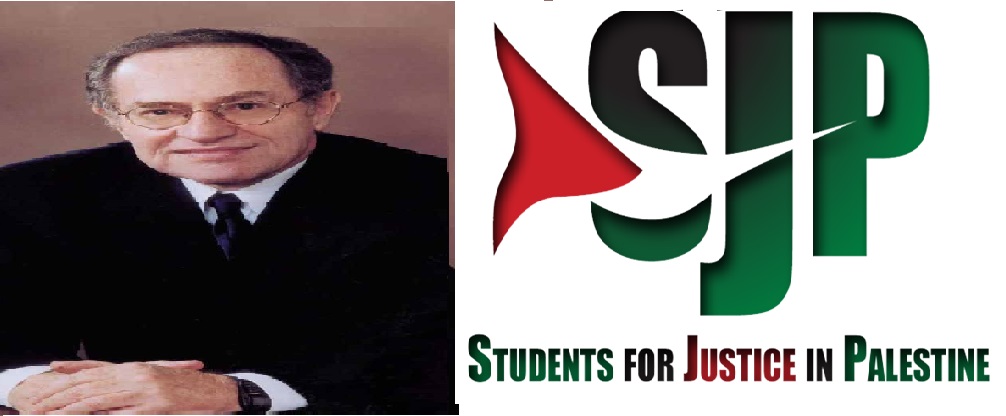
Recent occurrences on campuses have greatly undermined freedom of expression and should serve as a forewarning of what will happen in the future. While the hardliners of any ideological camp will seldom admit it, the perpetrators and victims have been people on both the left and right; both Zionists and anti-Zionists.
In a current case at Brandeis University, conservative student Daniel Mael has come under attack after publishing an article in Truth Revolt, where he is a regular contributor, on fellow Brandeis student Khadijah Lynch’s public tweets expressing her lack of sympathy for the two NYPD officers who were murdered by Ismaaiyl Brinsley.
Several students tried to get him expelled, accusing him of “slander,” “stalking,” “cyberbullying,” and “inciting racial hatred and oppression” for republishing what Ms. Lynch published. Herein lies the absurdity of relentless ideologues who only care about getting their way in the here and now—for them, the facts do not matter, nor do the principles that guide a free society.
But as it turns out, Ms. Lynch has been facing similar problems from agitators on the far right. A Facebook group with hundreds of members is calling for her to be expelled. Some people have been advocating her arrest and prosecution—thought police, indeed. Additionally, she has received an inundation of racist remarks and death threats. Mr. Mael deserves credit for decrying Ms. Lynch’s harassers as well as the Facebook group calling for her to be expelled.
In light of these circumstances, Alan Dershowitz’s article in support of Mr. Mael was an apt response to those on the predominantly liberal campus who have busied themselves attempting to curtail freedom of speech. In Prof. Dershowitz’s wise words, “Free speech for me but not for thee cannot become the operative motto of a great institution.”
It is important to note that while Prof. Dershowitz has often defended freedom of expression, he was fighting this principle in January 2013 while embroiled in an issue involving the political science department at Brooklyn College.
The department agreed to cosponsor a pro-BDS event, featuring renowned philosopher Judith Butler and anti-Israel activist Omar Barghouti organized by the college’s Students for Justice in Palestine (SJP) chapter. Prof. Dershowitz decried the co-sponsorship, incorrectly equating it with an endorsement of the ideas expressed and complaining that it was not a debate representing all sides. He also alleged that the political science department would never sponsor an anti-divestment night or a lecture by him.
In response, Paisley Currah, chair of the department, wrote a reply that drained his accusations of all validity. Prof. Currah stated: “In my 18 years at Brooklyn College, I cannot recollect our department turning down a single co-sponsorship request. Since this controversy broke—despite claims to the contrary—no group has contacted the department requesting co-sponsorship of a specific event or actual speaker representing the alternative or opposing views on BDS.”
Still more absurdly, Prof. Dershowitz claimed that he would oppose a pro-Israel event being sponsored by a department—apparently in order to remain consistent with his ostensible opposition to an academic department co-sponsoring an event without all sides represented. Yet, when Prof. Dershowitz spoke against the BDS movement at the University of Pennsylvania, in February 2012, the political science department there hosted him—without the presence of opposing viewpoints. He later stated that he did not know the department cosponsored it, but if he really cared, he would have made a small effort to check.
Furthermore, the idea that some students’ intellectual contributions to a college or university—through lectures or discussions—should not be acknowledged by academic departments because they are deemed too “one-sided” is, of course, a violation of academic freedom. While debates have their place in academia, so do other ways of presenting ideas, including lectures and presentations.
SJP was also condemned later for violating academic freedom at the Brooklyn College event. Left in charge, members of the group ejected four pro-Israel students after they started to hand out anti-BDS leaflets. The college administration stated that “there was no justification for the removal of the four students.” Additionally, they took responsibility for the lack of administrative oversight at the event.
Above all, people must be held accountable for wrongdoing that is harmful to others, irrespective of how great and distinguished they are or what side of an issue they are on. Prof. Dershowitz, who has been called “Israel’s single most visible defender,” is no exception. SJP is also no exception.
As Thomas Paine wrote: “What signifies it to me, whether he who does it, is a king, or a common man; my countryman or not my countryman; whether it is done by an individual villain, or an army of them?”
More recently, this past November, Brooklyn College was once again mired in controversy after State Assemblyman Steven Cymbrowitz (D-Brooklyn) wrote a letter to the college’s president, Karen Gould, asking her to cancel the an SJP event featuring Columbia Professor Katherine Franke and academic Steven Salaita.
People who take issue with SJP’s use of guerrilla tactics on campus—such as disrupting events and obstructing Birthright tables—raise some valid concerns. But when they start demanding that a college or university cancel lectures organized by SJP, or an academic department’s co-sponsorship of those lectures, they endanger the academic freedom of students and faculty.
In one of his fables, Aesop speaks about a time when there was war between the beasts and birds. The bat decided that he would affect to belong to whichever side triumphed. But when they discovered his hypocrisy, they realized he only cared for himself and rejected him. In the same way, those who support academic freedom only when it benefits them do not really support it at all.
It is often difficult to stay true to one’s principles when the offenders are both one’s friends and enemies. Doing the right thing sometimes means calling out those who may be fighting on your side of the battle, but who are also damaging the ethos of a free society.
Holly Bicerano is a student at Boston University.

